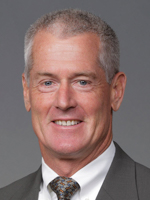Biomarkers, performance—a preview of the session and two others
Valerie Neff Newitt
June 2022—The effects of acute cannabis on driving performance and how impaired drivers can be detected will be reported at the AACC annual meeting July 24–28.
Sessions on serum COVID-19 antibodies and lab workforce solutions are two more of the many that await attendees in Chicago.
Thomas Marcotte, PhD, and Robert Fitzgerald, PhD, D(ABCC), of the University of California San Diego, say their study of 191 cannabis users is the largest placebo-controlled, randomized trial of its kind to evaluate the effect of cannabis on simulated driving performance (Marcotte TD, et al. JAMA Psychiatry. 2022;79[3]:201–209).
“Many previous studies had samples of about 20 people,” says Dr. Marcotte, professor of psychiatry and co-director of the UCSD Center for Medicinal Cannabis Research, which the state of California has funded for decades. The trial took place at the center from 2017 to 2019, with analysis completed in 2021.

Dr. Marcotte
The study approximated real-world behaviors, says Dr. Fitzgerald, professor of pathology. “We had people smoke to the level of highness they desire, and we examined the effects of different THC content levels.” At the meeting, he says, they will talk about the effects of the different content levels of THC on toxicology results, the time course of impairment, whether everyone becomes impaired, and the effects of tolerance in regular users.
One of the findings: THC content of the cigarette has little bearing on concentrations in blood and on performance. “People smoke to the level they desire, so there’s a clear self-titration,” Dr. Fitzgerald says.
Smokers feel the effects wear off at about 90 minutes and think they’re doing better, Dr. Marcotte says, but in fact they are doing the same as they did at 30 minutes. “So people who are hesitant to drive right after smoking may have good intentions when they say, ‘I’m not hitting the road. I’m too stoned.’ At an hour and a half, they start feeling they’re more capable of driving, when in fact they’re not.”
“Worse driving performance is evident for several hours post-smoking in many users,” they and their coauthors write in their article, “but appears to resolve by 4 hours 30 minutes in most individuals.”
The most frequent users showed behavioral tolerance, Dr. Marcotte says. “They could have a much higher THC concentration and do just as well as people with lower THC concentrations. But they also ingested more to get to a desired level of highness, so they ended up at the same spot as people who ingested less.” The tolerance was overcome by their ingesting more.

Dr. Fitzgerald
Study participants smoked either a 5.9 or 13.4 percent THC cannabis cigarette, “which is getting closer to what’s available in the dispensaries,” Dr. Fitzgerald says, noting several prior studies used lower percentages. “So this study used modern cannabis.”
There were nine blood draws and five driving simulations and field sobriety tests at four time points. “We show for the first time,” Dr. Fitzgerald says, “the combination of toxicology testing with field sobriety test results. That’s a unique aspect of this study.”
Many prior studies didn’t reflect real-world evaluations, Dr. Marcotte says. “We demonstrated that about half the people who got THC would be called impaired on the simulator. We also had drug recognition experts from California’s DRE program complete field sobriety tests on participants.” At the AACC meeting, they’ll report on the results of the field sobriety and simulator tests. “This is unique data in terms of the sample size, performance measures, and biofluid measurements of cannabinoids,” he says.
The findings of the COVID-19 Immunity Study will be reported in a session on serum COVID-19 antibodies: “Should We Do Testing for Clinical Diagnostics and Monitoring of Vaccine Efficacy?” Victoria Zhang, PhD, MBA, D(ABCC), vice chair and director of the Clinical Chemistry Division at the University of Rochester Medical Center, will share data gathered from samples collected at the AACC meeting last year for the COVID-19 immunology sample bank, housed at the CDC. The CDC’s Jefferson Jones, MD, PhD, will talk about guidelines for antibody testing, and Kara Lynch, PhD, D(ABCC), of UCSF will highlight novel serum antibody tests. And there will be a debate on the pros and cons of COVID-19 serum antibody testing for infected patients and those who are healthy and receive a vaccination or booster.
Dr. Zhang
 CAP TODAY Pathology/Laboratory Medicine/Laboratory Management
CAP TODAY Pathology/Laboratory Medicine/Laboratory Management
